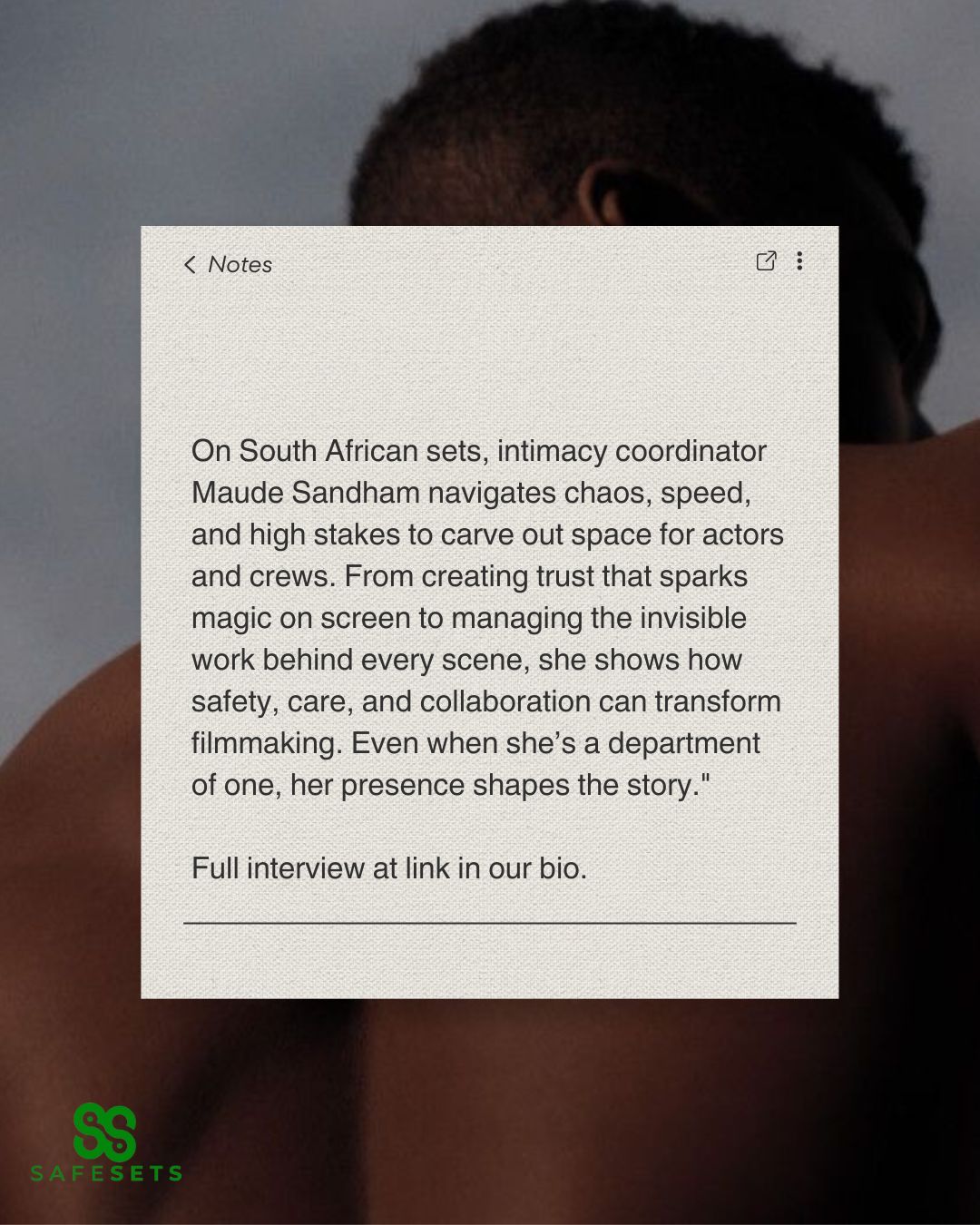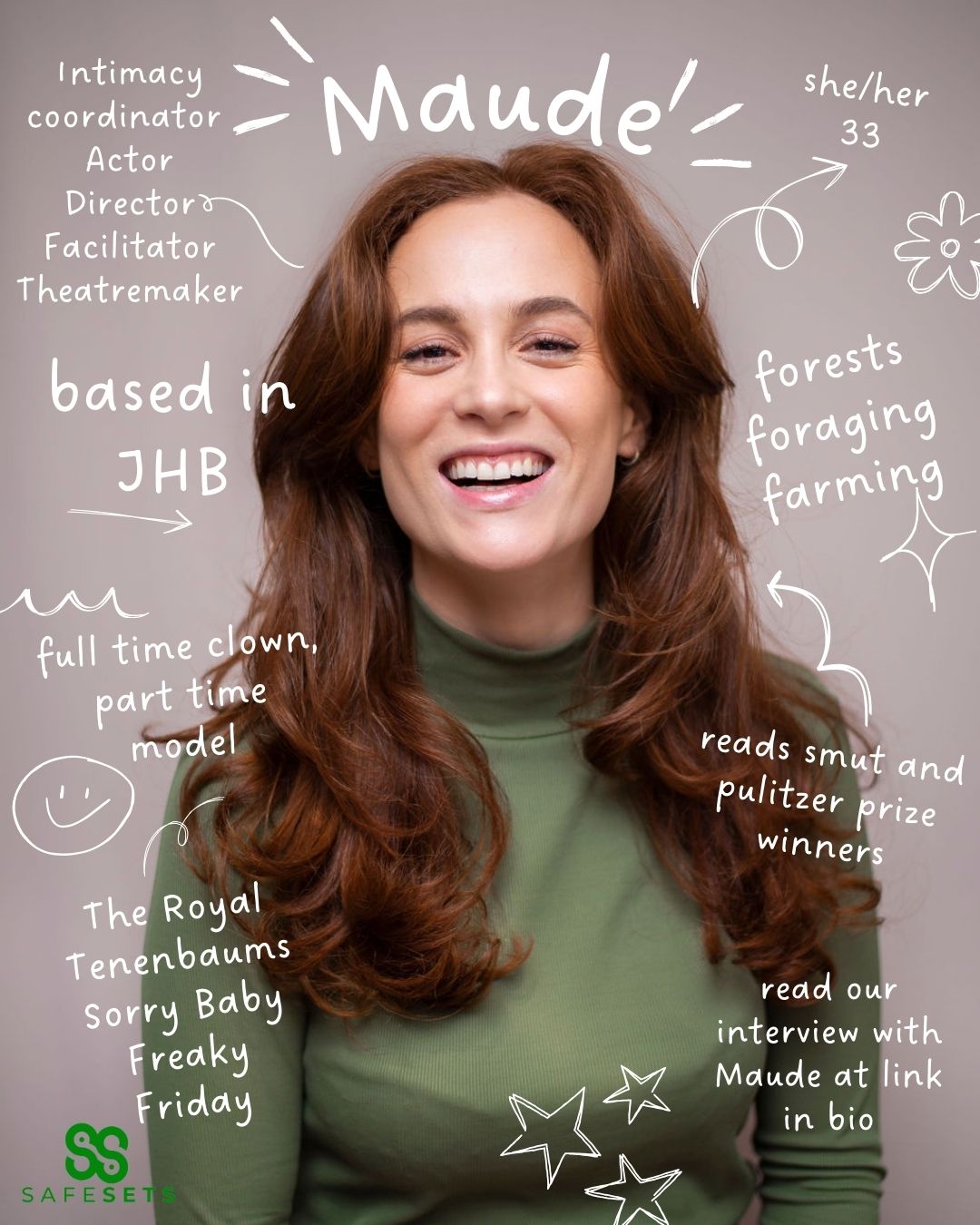Holding Space in the Wild West
Maude Sandham on intimacy, improvisation, and making space on South African sets
The intimacy coordinator is usually a department of one. In Johannesburg, where productions move at breakneck speed and budgets stretch thin, that can mean juggling fire-fighting with cappuccino breaks, choreography with quiet resistance. For Maude Sandham, one of South Africa's first intimacy coordinators, the job is about carving out space — literal and figurative — for actors, crews, and herself.
"Working here feels like the wild wild west," she laughs. "Fast, unpredictable. You never know what's going to change on the day. But I love the crews — there's always someone I know, always that feeling of family. Even when you're technically alone in your department, you're never really alone."
Sandham's entry into intimacy work came during lockdown. With theatres closed and sets paused, she logged into a South African Guild of Actors Zoom workshop led by Kate Lush. What struck her was not mystique but matter-of-factness: "It was so simple. Why aren't we doing this? That combination of care, creativity, and physicality — I knew I wanted to be in that role."
The South African context
Sam: What does it mean to do this work in South Africa?
Maude: It's a very complicated country. A complicated racial history. A continuing epidemic of gender-based violence. To work in intimacy here means holding all of that.
As a white woman, it feels like a privilege. Most of the actors I work with are people of colour, and to be trusted with their bodies in such intimate work is not something I take lightly. Sometimes my presence feels wrong — when the story belongs to a culture I don't come from. Other times, not knowing means I have to ask more questions, listen harder. That can spark richer collaboration.
But I can't ignore the fact that sometimes I'm afforded authority I haven't earned — authority that my whiteness gives me. That's a space I have to interrogate constantly: when to step forward, when to step back, when to amplify other voices.
Magic versus chemistry
Sam: People often worry intimacy work will kill the "chemistry." What's your take?
Maude: Magic and chemistry feel different. Chemistry is unstable — if you mix the wrong elements you might get a bomb instead of sunscreen (laughs). Magic is elusive, but when it happens everyone knows it. The trick is: it isn't sustainable if you just throw actors together and hope for the best. What I love about intimacy coordination is setting parameters. So when the magic does happen, it's repeatable and intentional — not left to chance or trauma.

The myth of safety
Sam: How do you think about safety?
Maude: Saying "this will be a safe space" isn't a promise anyone can make. Safe doesn't look the same to two different actors, no matter how similar their background. What I can do is stay present, keep asking questions, and help create practices that allow people to say no — without fear of consequences. As intimacy coordinators we often speak about creating brave spaces - spaces that allow actors to challenge themselves, allow creatives and technicians of all departments to risk creatively and grow their craft - without risking trauma, or a sustainable, healthy self and career. That's what safety means to me.
On South African sets
Sam: What are South African sets like for you?
Maude: Working here feels like the wild wild west sometimes (laughs). Things change fast. Sets are unpredictable. There's no luxury of time or money. So what I crave is space. Just one dedicated space on every set that isn't also craft or green room or a phone-charging station. A small bubble of quiet within the chaos where someone can ground themselves. That would change everything.
At the same time, there's a joy in the speed, the unpredictability. I always know someone on set, and that sense of crew-as-family is what makes it worth it. Even if, as intimacy coordinators, often we're a department of one.
The invisible work
Sam: People sometimes think intimacy coordinators just hand out robes and mints.
Maude: And ask people "are you okay?" (laughs). Most days it feels like managing lots of conflicting needs and wants, putting out many small fires. But I've had those days too — where everything in preproduction was so carefully handled that on set I felt redundant. I drank three cappucinos and thought, "am I doing enough?". But actually, that invisibility is the point. If all I'm doing on the day is checking in and handing out robes, it means the real work — trust, planning, risk management — has already been done. And as you've pointed out Sam, we are always "on". Present and observing, ready to step in should anything veer from the preparation done.
On other lives
Sam: And if you weren't doing this work?
Maude: Maybe I'd be a farmer. Dirty hands, soil, animals around me. Touching grass. That sounds good…
But on set, I dream of directing — shaping stories from that side. I've worked as a theatre director and theatre maker for many years. I love storytelling, but more specifically I love bringing the best people together to tell a story.
Sam: Okay, last question. If South Africa called you up tomorrow to compete in the Olympics, which sport would you do?
Maude: I'd do the heptathlon, or whatever it's called. I'd be collectively terrible at everything, but very determined. Or, a team sport of some kind. I'd do anything for the team. That's probably why I love this work. It's never just about me. It's always about the ensemble.
Interviewed in August 2025 by Samantha Murray.

